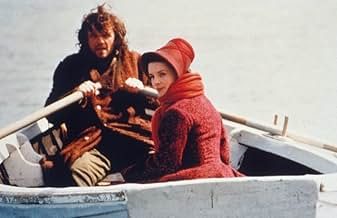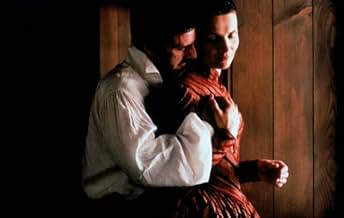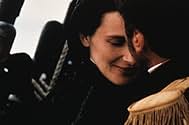CALIFICACIÓN DE IMDb
7.1/10
5.8 k
TU CALIFICACIÓN
Agrega una trama en tu idiomaIn a small French colony, a drunken man kills someone. While a guillotine is being shipped in, he changes, becoming a good and popular man.In a small French colony, a drunken man kills someone. While a guillotine is being shipped in, he changes, becoming a good and popular man.In a small French colony, a drunken man kills someone. While a guillotine is being shipped in, he changes, becoming a good and popular man.
- Dirección
- Guionistas
- Elenco
- Premios
- 3 premios ganados y 9 nominaciones en total
- Dirección
- Guionistas
- Todo el elenco y el equipo
- Producción, taquilla y más en IMDbPro
Opiniones destacadas
THE WIDOW OF ST.-PIERRE may not be a great film, but amidst a crop of mediocre current releases, it's a fine effort that boasts a hardworking cast, awesome costumes and sets, terrific cinematography and excellent direction. For those unlikely to stay in and read MOBY DICK, the combination of austere location, mid-19th-century maritime theme, and the Reaper looming o'er the ocean tides offers a satisfying divertissement on a cloudy Sunday afternoon.
Based on actual court records, the plot begins after a Parisian military captain, Jean (Daniel Auteuil), and his new wife, Madame La (Juliette Binoche), arrive on an isolated French isle off the coast of Newfoundland, where widows outnumber balmy days 50 to 1. One night, two blind-drunk men brutally knife a man to find out if he's `fat or just big.' The court sentences instigator Neel Auguste (Yugoslav director Emir Kusturica) to death by guillotine, `the widow,' in French parlance. But the remote fishing island does not possess the instrument of destruction that its French rulers dictate and must obtain a loaner from Martinique. While awaiting its arrival, the government locks Neel in a dark cell and entrusts him to the care of the Captain and Madame La.
An MSW waiting to happen, Madame has a weakness for `desperate cases.' She asks Neel to build her a greenhouse and tend her plants, a challenging request in this hardscrabble environment. As the Parisian belle negotiates her homesickness and the austerity of her surroundings by cultivating her garden, Neel confronts his own banishment from society and cultivates his compassion. This is one of several lovely parallelisms director Patrice Leconte teases out.
The sexual tension between Madame and Neel, though enacted subtly, is nevertheless palpable. During a reading lesson, their fingers brush while scanning a page. As Neel scarfs down her soup in a mildly bestial manner, she looks on lovingly. And when he asks her why she so nurtures him, she replies, `We change, whatever we do. I am sure of that.'
Meanwhile, the fisherfolks' tongues are wagging-ever cautioning Madame's loving husband about the duo's blossoming relationship. The Captain, however, venerates his wife's `humanism' and trusts her enough not to interfere. He is another wonderful character, both strong and sensitive, passionate in his love of his wife, unwilling to back down in his defense of their collective ideals.
Both Binoche and Kusturica prove more than equal to their roles. Binoche imbues her character with much more depth than that of Vianne in CHOCOLAT. With her limpid brown eyes and achingly empathic face, she elevates this personage to the level of classic tragic heroine. Kusturica, given a part that begs overacting, never wrings out our emotions, yet shows he possesses true remorse for his actions and a heart kinder still than that of his benefactors.
Most memorable is the set. Shot in Nova Scotia and Quebec, the film uses clapboard and stone buildings, often snow-salted, as an apt metaphor for the government's rigidity in refusing to commute Neel's sentence, despite his overwhelming popularity in the village as a doer of good deeds. Clearly the film excoriates capital punishment, with such dialogue as Madame's fervent cry, `They aren't punishing the same man they sentenced!'
This widow's walk proceeds at a leisurely pace, perhaps a mite too slowly for 21st-century attention spans. But overall, if you like a good, dark tragedy, pick a dreary night and go.
Based on actual court records, the plot begins after a Parisian military captain, Jean (Daniel Auteuil), and his new wife, Madame La (Juliette Binoche), arrive on an isolated French isle off the coast of Newfoundland, where widows outnumber balmy days 50 to 1. One night, two blind-drunk men brutally knife a man to find out if he's `fat or just big.' The court sentences instigator Neel Auguste (Yugoslav director Emir Kusturica) to death by guillotine, `the widow,' in French parlance. But the remote fishing island does not possess the instrument of destruction that its French rulers dictate and must obtain a loaner from Martinique. While awaiting its arrival, the government locks Neel in a dark cell and entrusts him to the care of the Captain and Madame La.
An MSW waiting to happen, Madame has a weakness for `desperate cases.' She asks Neel to build her a greenhouse and tend her plants, a challenging request in this hardscrabble environment. As the Parisian belle negotiates her homesickness and the austerity of her surroundings by cultivating her garden, Neel confronts his own banishment from society and cultivates his compassion. This is one of several lovely parallelisms director Patrice Leconte teases out.
The sexual tension between Madame and Neel, though enacted subtly, is nevertheless palpable. During a reading lesson, their fingers brush while scanning a page. As Neel scarfs down her soup in a mildly bestial manner, she looks on lovingly. And when he asks her why she so nurtures him, she replies, `We change, whatever we do. I am sure of that.'
Meanwhile, the fisherfolks' tongues are wagging-ever cautioning Madame's loving husband about the duo's blossoming relationship. The Captain, however, venerates his wife's `humanism' and trusts her enough not to interfere. He is another wonderful character, both strong and sensitive, passionate in his love of his wife, unwilling to back down in his defense of their collective ideals.
Both Binoche and Kusturica prove more than equal to their roles. Binoche imbues her character with much more depth than that of Vianne in CHOCOLAT. With her limpid brown eyes and achingly empathic face, she elevates this personage to the level of classic tragic heroine. Kusturica, given a part that begs overacting, never wrings out our emotions, yet shows he possesses true remorse for his actions and a heart kinder still than that of his benefactors.
Most memorable is the set. Shot in Nova Scotia and Quebec, the film uses clapboard and stone buildings, often snow-salted, as an apt metaphor for the government's rigidity in refusing to commute Neel's sentence, despite his overwhelming popularity in the village as a doer of good deeds. Clearly the film excoriates capital punishment, with such dialogue as Madame's fervent cry, `They aren't punishing the same man they sentenced!'
This widow's walk proceeds at a leisurely pace, perhaps a mite too slowly for 21st-century attention spans. But overall, if you like a good, dark tragedy, pick a dreary night and go.
8=G=
As the best of French cinema does so adroitly, "The Window of Saint-Pierre" tells most of it's story laconically with knowing looks and subtle behaviors while the story it tells is a relentlessly plodding drama of unspoken words and the emotions they evoke. "Widow..." is more about integrity, honor, love, and other intangibles than it is about its relatively simple storyline and the characters involved. A beautifully crafted somber film, "Widow..." is recommended for mature audiences because a measure of maturation is required to appreciate all this austere film has to offer.
I have always been a Patrice Leconte devotee. His career in which incoherence and eclecticism get on well together (perhaps that's why he's often slated by French critics) is one of the most fruitful you could dream of, even if French mainstream public often associates his name with "les Bronzés" (1978), a commercial hit which put him on the map as well as the actors, the famous troupe of the Splendid and tends to overshadow the rest of his prolific career which spawned treasures like "Tandem" (1987), "Monsieur Hire" (1989) or "Le Mari De la Coiffeuse" (1990).
This vehicle "La Veuve De Saint Pierre" (2000) was originally to be directed by another veteran of French cinema Alain Corneau (who sadly shot the insipid "Prince Du Pacifique" that year, perhaps the nadir of his career) but he turned down the role due to disputes with the producers. So, Patrice Leconte inherited the project. His choice was motivated by the desire to work with one of the two main roles, Juliette Binoche (he had teamed up with Daniel Auteuil the previous year for "La Fille Sur Le Pont, 1999)
The title of the film has a double meaning: the "veuve" refers to Binoche after her husband's demise. The opening sequence presents her to us in her mourning garb (Leconte's work is served by lavish costumes). The audience knows that she is the "veuve" and will discover in the long flashback, how she has lost her husband. But a "veuve" is also a slang word for the sinister guillotine and it has a tongue-in-cheek connotation: Saint Pierre unlike France hasn't got a death instrument and must have one. All the time, the island is deprived of a guillotine, it remains a "veuve".
There are clearly two sides. On the one hand, the officers' who govern the island and are die-hards of the death sentence and on the other hand, the private triangle which encompasses Auteuil, Binoche and Kusturica. Between the two poles, the impending threat of the execution with the recurring images of the ship sailing across the Atlantic with on board the guillotine. The scenario eschews the tempting trap of the Manicheism and the officers aren't caricatures. As a matter of fact, one of the main thrusts of the film is to deride the leaders of the island who seek at all costs to keep the death sentence and their obstinacy is made ludicrous by the postpone of the sentence and the last words of the voice over contain grim details which give a slap to one of Doctor Guillotin's famous words: "a painless death is a progress for humanity". Moreover, they prove to be unscrupulous because when a new inhabitant settles on the island, they entrust him the role of the executioner without taking care of his opinion.
In the private triangle, madame La by guiding Neel on the way of redemption is full of condescension and solicitude but she's a complex character. Her reasons and motivations to redeem Neel are rather elusive even if she says (I don't remember the accurate cue): "I think human soul is unpredictable and can be able to become conscientious and intelligent. A little gratifying cue which should have been more construed and fleshed out and remains an inkling. Then, why would she encourage the sacrifice of such a devoted husband to try to save a convicted killer whereas it's doomed to failure? Is it a response to her husband's love? (If Auteuil sacrifices himself it's for love for his wife and respect for Neel). Certainly and if so, Leconte's piece of work is a novel and quirky approach on the relationship between husband and wife, a quite notable feat for an author who has seldom studied this topic in his filmography, except maybe in "Le Mari De La Coiffeuse".
Buoyed by a more than palatable cast with a special mention to Emir Kusturica who was a discerning choice because he could convey vulnerability and fragility to his persona of great strapping man, "La Veuve De Saint Pierre" may be derivative if we consider the theme of redemption and the thrust quoted in the fourth paragraph but its treatment is a far cry from Hollywood's formulaic conventions. How to rank it in Leconte's uneven but usually riveting filmography? It isn't on a par with his towering achievements but stands out as a more than palatable flick which however could have gained by being more deepened.
This vehicle "La Veuve De Saint Pierre" (2000) was originally to be directed by another veteran of French cinema Alain Corneau (who sadly shot the insipid "Prince Du Pacifique" that year, perhaps the nadir of his career) but he turned down the role due to disputes with the producers. So, Patrice Leconte inherited the project. His choice was motivated by the desire to work with one of the two main roles, Juliette Binoche (he had teamed up with Daniel Auteuil the previous year for "La Fille Sur Le Pont, 1999)
The title of the film has a double meaning: the "veuve" refers to Binoche after her husband's demise. The opening sequence presents her to us in her mourning garb (Leconte's work is served by lavish costumes). The audience knows that she is the "veuve" and will discover in the long flashback, how she has lost her husband. But a "veuve" is also a slang word for the sinister guillotine and it has a tongue-in-cheek connotation: Saint Pierre unlike France hasn't got a death instrument and must have one. All the time, the island is deprived of a guillotine, it remains a "veuve".
There are clearly two sides. On the one hand, the officers' who govern the island and are die-hards of the death sentence and on the other hand, the private triangle which encompasses Auteuil, Binoche and Kusturica. Between the two poles, the impending threat of the execution with the recurring images of the ship sailing across the Atlantic with on board the guillotine. The scenario eschews the tempting trap of the Manicheism and the officers aren't caricatures. As a matter of fact, one of the main thrusts of the film is to deride the leaders of the island who seek at all costs to keep the death sentence and their obstinacy is made ludicrous by the postpone of the sentence and the last words of the voice over contain grim details which give a slap to one of Doctor Guillotin's famous words: "a painless death is a progress for humanity". Moreover, they prove to be unscrupulous because when a new inhabitant settles on the island, they entrust him the role of the executioner without taking care of his opinion.
In the private triangle, madame La by guiding Neel on the way of redemption is full of condescension and solicitude but she's a complex character. Her reasons and motivations to redeem Neel are rather elusive even if she says (I don't remember the accurate cue): "I think human soul is unpredictable and can be able to become conscientious and intelligent. A little gratifying cue which should have been more construed and fleshed out and remains an inkling. Then, why would she encourage the sacrifice of such a devoted husband to try to save a convicted killer whereas it's doomed to failure? Is it a response to her husband's love? (If Auteuil sacrifices himself it's for love for his wife and respect for Neel). Certainly and if so, Leconte's piece of work is a novel and quirky approach on the relationship between husband and wife, a quite notable feat for an author who has seldom studied this topic in his filmography, except maybe in "Le Mari De La Coiffeuse".
Buoyed by a more than palatable cast with a special mention to Emir Kusturica who was a discerning choice because he could convey vulnerability and fragility to his persona of great strapping man, "La Veuve De Saint Pierre" may be derivative if we consider the theme of redemption and the thrust quoted in the fourth paragraph but its treatment is a far cry from Hollywood's formulaic conventions. How to rank it in Leconte's uneven but usually riveting filmography? It isn't on a par with his towering achievements but stands out as a more than palatable flick which however could have gained by being more deepened.
Juliette Binoche plays the wife of a military officer in a remote island town in 1849 Newfoundland who becomes devoted to the cause of saving the life of a condemned murderer. I was torn between admiring `The Widow of Saint-Pierre' for not taking the obvious route of having the captain's wife fall in love with her protege and run off with him (e.g., `Mrs. Soffel"), and a feeling of letdown that it was avoiding opportunities for more vivid and realistic drama. That there is an attraction between the two is made clear, especially in the highly charged, yet muted eroticism of the reading lesson scene. This film was based on a true story, but I couldn't help wondering if the actual killer was as saintly and devoid of guile as he seems in this movie. Among other things, he resists his attraction to his benefactress, although she would probably be more than willing to sleep with him, saves the life of a village woman whose house has slipped its moorings, and passes up an excellent chance to escape because he doesn't want to get anybody in trouble. He impregnates another woman, although it appears to be true love, and he then does the decent thing and marries her. One could accept that a criminal could be redeemed, but here he's a little too good to be true, reinforcing my suspicion that the characterization was meant more to reinforce the filmakers' anti-capital punishment stance than as a reflection of his actual personality. Daniel Auteil as her husband is stuck playing a character whose emotions remain largely inscrutable. The film would have us believe that there is no jealousy or resentment in the husband as his wife dedicates her life to rehabilitating and saving the condemned man under his charge. Ultimately, the captain gives up his own life for both of them, but I kept waiting for a significant sign that he had some inner conflict about doing so. After all, he is a career military officer sworn to uphold the law as it is. Who knew that underneath he was a bleeding heart liberal! This film is interesting and absorbing up to a point, but ultimately, it's also bland and overly complacent dramatically.
I was most impressed with the visual language of this movie that does not waste words to show emotions. The tensions are well reflected in the play of the actors, whose gestures, shrugs and smiles say more than a thousand lines.
Another interesting feature of the movie is that it does not follow the easy path of romance that is "expected" by the public. In turn, it exposes a world which is cruel, unfair, where justice is determined by personal interests and where those who fight the system are seen as mad and excluded from the "high society".
It is a movie about the determination to fight for something one believes in!
Another interesting feature of the movie is that it does not follow the easy path of romance that is "expected" by the public. In turn, it exposes a world which is cruel, unfair, where justice is determined by personal interests and where those who fight the system are seen as mad and excluded from the "high society".
It is a movie about the determination to fight for something one believes in!
¿Sabías que…?
- TriviaThe film was to be completely filmed on the island of Saint-Pierre, but when the snow failed to arrive, the production had to move further north to Newfoundland for certain sequences.
- ErroresWhen Neel is told he's strong enough to "ramer jusqu'au chez les Anglais", the English subtitles say "row over to Canada" rather than "row over to the English". This introduces an error: both the geography and the dialogue in other scenes make it clear that Newfoundland is meant, but Newfoundland wasn't part of Canada until 1949.
- ConexionesFeatured in The 58th Annual Golden Globe Awards 2001 (2001)
Selecciones populares
Inicia sesión para calificar y agrega a la lista de videos para obtener recomendaciones personalizadas
- How long is Widow of St. Pierre?Con tecnología de Alexa
Detalles
- Fecha de lanzamiento
- Países de origen
- Sitio oficial
- Idioma
- También se conoce como
- Widow of St. Pierre
- Locaciones de filmación
- Fortress of Louisbourg, Louisbourg, Nova Scotia, Canadá(as Saint-Pierre)
- Productoras
- Ver más créditos de la compañía en IMDbPro
Taquilla
- Presupuesto
- FRF 100,000,000 (estimado)
- Total en EE. UU. y Canadá
- USD 3,193,889
- Fin de semana de estreno en EE. UU. y Canadá
- USD 31,702
- 4 mar 2001
- Total a nivel mundial
- USD 7,193,889
- Tiempo de ejecución1 hora 52 minutos
- Color
- Mezcla de sonido
- Relación de aspecto
- 2.35 : 1
Contribuir a esta página
Sugiere una edición o agrega el contenido que falta
































